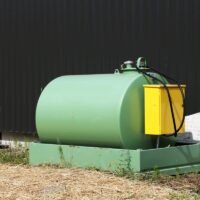Regulated vs. Unregulated Storage Tanks

Not all underground storage tanks (USTs) are treated the same under New Jersey law. There is a long list of regulatory and administrative requirements for dealing with a UST on your property, particularly if there is a leak and/or potential contamination. New Jersey’s Administrative Code specifically exempts certain types of USTs from these regulations, however. While some duties still apply regardless of the regulatory status of tanks, it is helpful to know whether your tank falls within one of the noted exemptions. Below, we discuss the classes of USTs that are not subject to the general regulations and what duties may still apply even for “unregulated” tanks. Call a licensed underground storage tank remediation and removal professional if you need assistance with a damaged or contaminated UST.
Unregulated Tanks: Exemptions for USTs
Chapter 7:14B of New Jersey’s Administrative Code (NJAC) covers New Jersey Department of Environmental Protection (NJDEP) rules governing underground storage tank facilities applicable to covered individuals and businesses. NJAC 7:14B imposes various financial obligations on landowners and other responsible parties for remediation of discharged hazardous substances, establishes UST management and compliance practices, and dictates classes of operators and training requirements for operators of USTs.
Pursuant to NJAC 7:14B-1.4(b), however, certain types of underground storage tank systems “are exempt from the requirements of this chapter.” Fifteen exemptions are listed, including:
- Farm or residential tanks storing 1,100 or fewer gallons of motor fuel for noncommercial purposes;
- Tanks with a capacity of 2,000 gallons or less used to store heating oil for onsite consumption in non-residential buildings;
- Tanks used to store heating oil for onsite consumption in residential buildings;
- Septic tanks installed pursuant to the Realty Improvement Sewage and Facilities Act
- Pipelines subject to certain other applicable regulations;
- Certain surface impoundments, pits, ponds, lagoons, stormwater or wastewater collection systems;
- Liquid traps or gathering lines used in oil and gas production;
- Tanks situated above the surface of the floor, or uncovered and equipped with secondary containment, although stored in an underground area such as a basement, cellar, or mine
- Flow-through process tanks;
- Wastewater treatment tanks;
- Electrical Equipment;
- Hydraulic lift tanks;
- USTs holding hazardous waste listed or identified under Subtitle C of the Solid Waste Disposal Act, or a mixture of such hazardous waste and other regulated substances
Certain other types are partially regulated, subject only to certain provisions. Typical real estate transactions are most likely to deal with the first three categories of unregulated USTs. Understanding your obligations and requirements with regard to unregulated USTs can significantly ease the cost and hassle of a real estate transaction involving a UST.
Leaks Must Always Be Dealt With
It’s important to keep in mind that, although certain types of tanks are not generally subject to the regulations imposed by New Jersey’s Administrative Code chapter pertaining to USTs, property owners are still subject to certain requirements. Whether regulated or “unregulated,” any leaking underground storage tank must be reported, investigated, and remediated pursuant to the terms of the Site Remediation Reform Act (SRRA). The parties legally responsible for the leaking tank must retain a properly licensed remediation specialist to close the leak, investigate potential contamination, and conduct a proper and thorough remediation effort.
For that reason, “unregulated’ is somewhat of a misnomer for tanks falling under the relevant exemptions. New Jersey, however, has instituted a streamlined program for remediation of unregulated heating oil tanks.
The Seasoned Remediation Pros at Lutz Are Here to Field Your Underground Storage Tank Issues
If you discover a UST at your construction worksite or if you have to respond to a UST spill on your property, you need experienced help from professional advisors with years of underground storage tank experience. For learned and effective assistance dealing with a UST on your property, call Herbert Lutz & Company in Florida at 954-971-5222, or in New Jersey at 908-862-8888.
